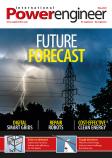Throughout Europe, smart metering legislation is driving utilities to optimise their grids. Eugene McCarthy reports.
With many European countries requiring smart metering to be in place by 2020, utilities are now turning to suppliers of smart meters and other smart grid hardware in order to achieve the necessary goals.
In Denmark, a consortium of eight Danish utilities, the MV Group, has commissioned Kamstrup to deliver 153,000 smart meters over a three-year period. Kamstrup, also a Danish company, is a leading manufacturer of smart energy solutions.
The upgrade to smart meters is expected to make the utility group ready for the smart grid by enabling crucial optimisations of grid management and administration.
Spokesman for the MV Group Per Nielsen, said: "With these meter replacements, we are looking forward to offering the most modern technology on the market to our customers, who will be able to follow their energy usage in detail and decrease it accordingly."
For the utilities, the investment means a rewarding pay-off: "There is no doubt that our new smart metering system will give all companies a lower total cost per year, and we expect a payback time of just seven to ten years," he added.
The system to be delivered is Kamstrup's OMNIA Smart Grid suite that will comprise all supply forms in the areas including electricity, heat and water meters. All meters will be connected to the same system, delivering big data to the utilities, who can benefit from a fine grained picture of supply and consumption - the most needed prerequisites of a strong customer service and grid optimisation (Fig. 1).
The order follows in the wake of the long-awaited announcement of the Danish Energy Agency that all electricity meters must be remotely read by the end of 2020, allowing consumers to track their consumption hour by hour.
Moving to Austria, Echelon and its partner Kapsch Smart Energy have won several smart metering pilots with leading Austrian utilities Wien Energie, IKB and Steiermark. The pilots, which together represent potential future orders of nearly 3.5million smart meters and networked energy services (NES) software platform licenses, are being prompted by a new energy edict in Austria that requires utilities to achieve specific grid modernisation goals by 2019.
"As Austrian utilities work towards compliance with the new energy law, Echelon is winning important pilots by offering products that enable utility companies to not only meet the new mandates, but also improve the overall safety, efficiency and reliability of their energy grid," said Michael Anderson, Echelon's senior vice president and general manager, grid modernisation.
Future developments
With an eye on future developments, he added, "These pilots represent early traction in a crucial phase of this growing market. With our continued success in demonstrating the value that NES offers to our customers, Echelon is well positioned to compete for large-scale deployment tenders once that process begins."
The pilots are scheduled to take place through 2014 and utility companies are expected to begin rolling out smart meters throughout Austria in high volume beginning in 2015.
In Germany, Siemens Smart Grid division is expanding its smart-grid platform EnergyIP with the addition of application software components for the German smart metering market.
Siemens says the move will provide power supply companies with a central IT solution for the administration of smart-meter gateways and for the processing of encrypted and signed energy consumption measurement data.
This solution enables power suppliers to connect smart metering systems consisting of a smart-meter gateway and smart basic meters to their central IT system - and it fulfils the requirements for data protection and data security stipulated by the German Federal Office of Information Security in its smart energy technical directive.
"The growing integration of information and communication technology in power supply networks that are being developed into smart grids is increasingly focusing attention on the issue of cyber security. The requirements that must be met in terms of data security - from the beginning to the end of a transmission line, including all products, systems, solutions, and processes - are getting stricter all the time. From our extensive smart grid portfolio, we are providing power suppliers and utilities with the right solutions to meet their needs," said Jan Mrosik, ceo of the Siemens Smart Grid Division.
The company has also rolled out smart grid remote terminal units for decentralised energy resources. The Sicam SGU can be used to connect distributed energy resources to a grid control or energy management system by means of communications technology (Figure 2). Used as an input/output (I/O) unit, Sicam SGU allows power companies and public utilities to control and monitor decentralised power generation facilities and power consumers via the smart grid remote terminal unit. In particular, it can be used for bundling decentralised energy sources into a virtual power plant, for demand-response applications, and for setting up micro-grids.
Balancing out power generation and power consumption at all times is a bigger challenge for the control system in smart grids, with their many renewable energy sources and controllable loads, than in conventional grids. To meet this challenge, the system requires communications-capable I/O units such as the Sicam SGU to control and monitor the field level, says the company.
Smart grid alliance eyes the Middle East
Spanish utility Iberdrola plans to join forces with the smart grid division of Siemens in order to win business in the Middle East.
As a first step, the two parties have signed a memorandum of understanding stating that they intend to negotiate a contract for a strategic alliance. As part of this alliance, the partners plan to develop smart grid technologies for Qatar and then the entire Middle East.
Augustin Delgado, innovation, environment and quality director at Iberdrola, said, "This alliance is an extraordinary opportunity to introduce successful technological transfer projects to the region, while adding value for customers through the proven experience of two leaders in their respective sectors."
For its part, Siemens says the alliance will give it the opportunity to better understand its customers' requirements.
Areas in which the partners hope to cooperate include the integration of energy from renewable sources such as the sun and wind into smart grids. In addition, both companies intend to develop systems designed to balance the supply and demand for energy (demand response management). Such a balance not only ensures network stability but helps utilities by eliminating the need to draw on expensive peak-load power plants.
The two also plan to cooperate in monitoring and controlling of the distribution grids. Here, new technologies allow for an improved integration of outage management and an advanced level of grid automation. This, they say, will enable utilities to operate their grids more reliably and more efficiently.
















